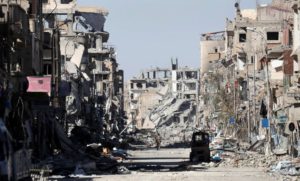What now for Raqqa?
 After years of fighting, Islamic State has finally been driven out of the city of Raqqa, its main stronghold in Syria.
After years of fighting, Islamic State has finally been driven out of the city of Raqqa, its main stronghold in Syria.
But the victory over IS has produced little cheer because Raqqa is now a ghost town, reduced to rubble and still a dangerous place because of unexploded ordinance.
And as winter sets in, the city’s new masters are in a race against time to make it fit for habitation once again.
Raqqa’s Naeem roundabout was once a symbol of IS rule; the setting for bloody propaganda videos featuring black banners over crucified bodies and severed heads.
Now, the roundabout is draped in the yellow flags of the Syrian Democratic Forces (SDF), a Kurdish-Arab coalition fighting to destroy IS, aided by the United States and dozens of other countries.
Since the SDF offensive began, the coalition has dropped some 20,000 bombs and shells on the city, a coding to the conflict monitoring group Airwars.
Humanitarian news outlet IRIN says that at least eight per cent of Raqqa is now uninhabitable, partly because of the destruction, and unexploded munitions and a lack of electricity and water.
The UN says more than 312,000 people have fled Raqqa province as a whole, and many of the city’s former inhabitants are now stuck in camps in the barren, SDF-controlled countryside north of the city. Conditions there are said to be miserable”.
And, NGO Save the Children warns that many of the displaced could be trapped in makeshift camps for years to come.
Already, the UN is distributing “winterisation kits” across Syria – these include insulation, floor mats, waterproofing, and a heater for tents.
The security situation in Raqqa is extremely precarious. The SDF has reported that IS fighters are still thought to be hiding inside the city.
There are also landmines and unexploded US bombs to be cleared before people can return.
One once this has been done, then begins the job of rebuilding and governing the city.
The SDF has said it will hand power over to the Raqqa Civil Council which is represenative of all local groups.
But Kurdish groups are the real power behind the liberation of Raqqa and there are reports they are linked to the Kurdistan Workers’ Party (PKK), which appears to now have real control over Raqqa.
Humanitarian aid is crossing Syria’s border with Turkey, but the SDF’s links to the PKK means Turkey may block anything headed for Raqqa.
The US has been a staunch ally of the Syrian Kurds and is supply aid that can help rebuild the city.
But Washington has made it clear that there are limits to how much non-military assistance it will provide, and that it won’t engage in long-term nation-building.
The US is also torn between its support for the SDF and its crucial relationship with NATO member Turkey.
With Saudi Arabia’s crown prince, Mohammed bin Salman, vowing to return his country to ‘moderate Islam’, there may be a role for it to play in rebuilding Raqqa.
But reconstruction is a longer-term goal and preparing for winter in camps like Ain Issa is a priority for aid groups.
Observers says that while the conservative Sunni Arab regimes in Saudi and Abu Dhabi have traditionally been suspicious of Syrian Kurdish aspirations, currently their interests align as the PKK’s arch-enemy Turkey has voiced support for the Gulf states’ local rival Qatar and the Syrian regime of Bashar al Assad is closely allied with their regional nemesis Iran.
But perhaps more dangerous is a potential scenario that would see Assad’s regime pushing further east and clashing with the SDF.
The US and Russia have worked to prevent hostilities between their respective allies, but that could all change as Syria moves toward the end of the conflict with IS.
The SDF appears to have realised that without US backing their position takes a quantum backward step.
So they have said they will negotiate with Assad and anyone else.
A slew of questions remain to be answered before we’ll know how all this will play out. Syria’s local politics have a tendency to get snagged in international rivalries. Raqqa’s reconstruction will clearly be no exception.
It remains to be seen how all this will play out.
Laurie Nowell
AMES Australia Senior Journalist












